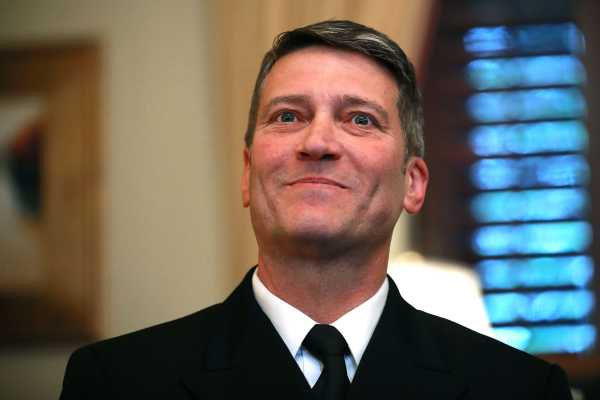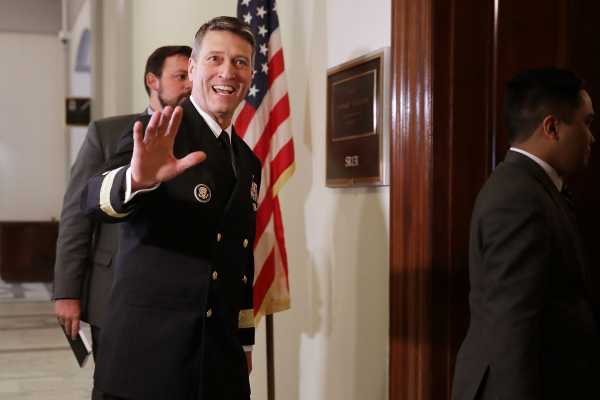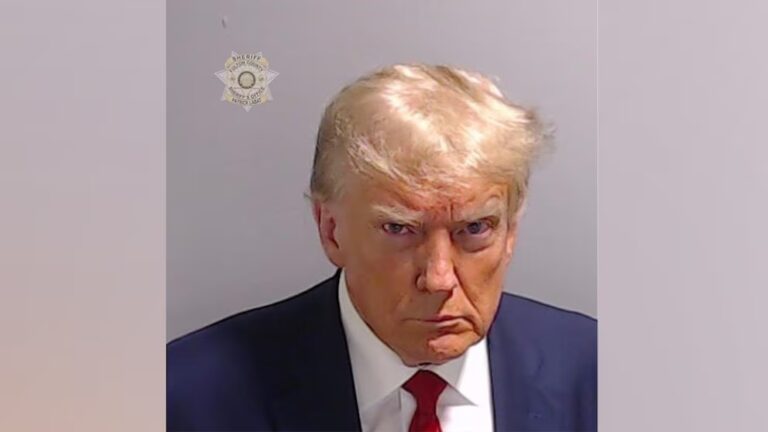
Dr. Ronny Jackson, President Donald Trump’s personal doctor and pick to lead the Department of Veterans Affairs, just withdrew his name from consideration for the job.
Here’s why: Jackson, a Navy admiral with very little management experience, faced mounting concerns in the Senate over allegations of misconduct. Whistleblowers claim the White House’s top doctor drank too much on the job, oversaw a “toxic” work environment, and even overprescribed medication. Lawmakers on Tuesday postponed Jackson’s confirmation hearing, originally scheduled for Wednesday, in light of the claims.
In an interview on Fox & Friends on Thursday morning, Trump called these claims “false accusations,” adding that “there is no proof” for the allegations.
That’s a different tone than the president struck earlier in the week. During a press conference alongside French President Emmanuel Macron on Tuesday, Trump said he was unaware of any allegations against Jackson but that “it’s totally his decision” whether to remove himself from consideration. “I don’t want to put a man through a process like this,” he added, referring to the confirmation process. “It’s too ugly, and it’s too disgusting.”
Hours after the press conference, the Associated Press reviewed a copy of a 2012 watchdog report that showed Jackson and another physician — Dr. Jeffrey Kuhlman, President Barack Obama’s personal physician — were in the midst of a “power struggle” and displayed “unprofessional behaviors.” However, the report says nothing about excessive drinking or improperly dispensing medication.
Jackson admitted he failed to keep his rivalry with Kuhlman hidden from staff. “[M]any also believe that CAPT Jackson has exhibited poor leadership” while fighting with Kuhlman, according to the report, which mentions Jackson’s Navy rank at the time. The six-page report by the Navy’s medical inspector general recommended that the White House, then under Obama’s control, remove one or both of them. Jackson became Obama’s top doctor in 2013 and Kuhlman left the White House medical team.
Things got tougher for Jackson on Wednesday when the New York Times published details from a memo alleging that the doctor had a pattern of substance abuse and careless prescribing of drugs. Democratic staffers working for the Senate Veterans Affairs Committee compiled the document as part of their background investigation of Jackson ahead of potential confirmation hearings.
According to the memo, Jackson wrote himself prescriptions before getting caught, provided a “large supply” of the opioid Percocet to a White House military aide without filling out paperwork, and destroyed a government vehicle while drunk.
The memo also alluded to an incident from a 2015 overseas trip where Jackson allegedly banged so loudly on a female colleague’s door while drunk that the Secret Service stepped in so he wouldn’t wake the president.
Trump on Thursday blamed Sen. Jon Tester (D-MT), the top Democrat on the Senate Veterans Affairs Committee, for making the memo of allegations public. “I think Jon Tester has to have a big price to pay in Montana,” Trump said, eluding to Tester’s future reelection chances.
Jackson will remain a White House doctor, but not necessarily Trump’s personal physician. But at the start of the week, it looked like Jackson, a revered combat surgeon, would continue his climb to the top as the leader of the government’s second-largest bureaucracy. Now the man who can reportedly repair almost anything must turn his attention to fixing his own reputation.
How Jackson got the VA secretary nomination

Trump isn’t the only president to have had warm feelings for Jackson, who often went the extra mile for his patients. An April 19 Washington Post profile of Jackson noted:
Jackson seemingly got the nomination because he went the extra mile for Trump too. He spent more than an hour last January answering questions about the president’s mental and physical health. During that press conference, the Navy doctor famously said, “if [Trump] had a healthier diet over the last 20 years, he might live to be 200 years old.”
Jackson already had a good rapport with Trump — as the top White House doctor, he has to travel and spend time with the president — but his performance at this press conference made him a star in Trump’s eyes.
On March 28, Trump tweeted his intent to nominate Jackson to lead the VA after reportedly pushing out former Secretary David Shulkin over disagreements about how best to provide medical care for veterans. (Basically, Trump wants to privatize that care; Shulkin wanted to reform the way the government provides services. They battled over that issue for months until Trump finally removed him.)
But it turns out that Jackson received almost no vetting before Trump’s tweet. Had he gone through the normal vetting process, it’s likely the administration would have gotten at least some warning signs about his possible misconduct before making the pick.
Jackson was seen as a strange choice from the start. Before joining the White House he was a top combat surgeon, at one point overseeing dozens of staffers in Iraq. Now he leads a small office of around 70 employees with a minimal budget and a simple mission: treat the president, the first family, and others at the White House.
Leading the Department of Veterans Affairs, though, is an entirely different job. It employs around 375,000 people with a budget surpassing $185 billion. Only the Defense Department is a bigger US government agency. Senate Republicans quietly grumbled that Jackson didn’t have the management experience required to run such a large bureaucracy. Trump acknowledged Tuesday that “I know there’s an experience problem” with Jackson.
On Fox & Friends Thursday morning, Trump promised a new nominee with more political experience.
Back in March, I asked Anthony Principi, the veterans affairs secretary from 2001 to 2005, how Jackson could best lead the VA. “He has to command the respect and restore morale and leadership to the department. That’s the most important challenge ahead of him,” he told me.
Jackson doesn’t have to worry about that challenge anymore.
Sourse: vox.com






